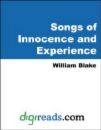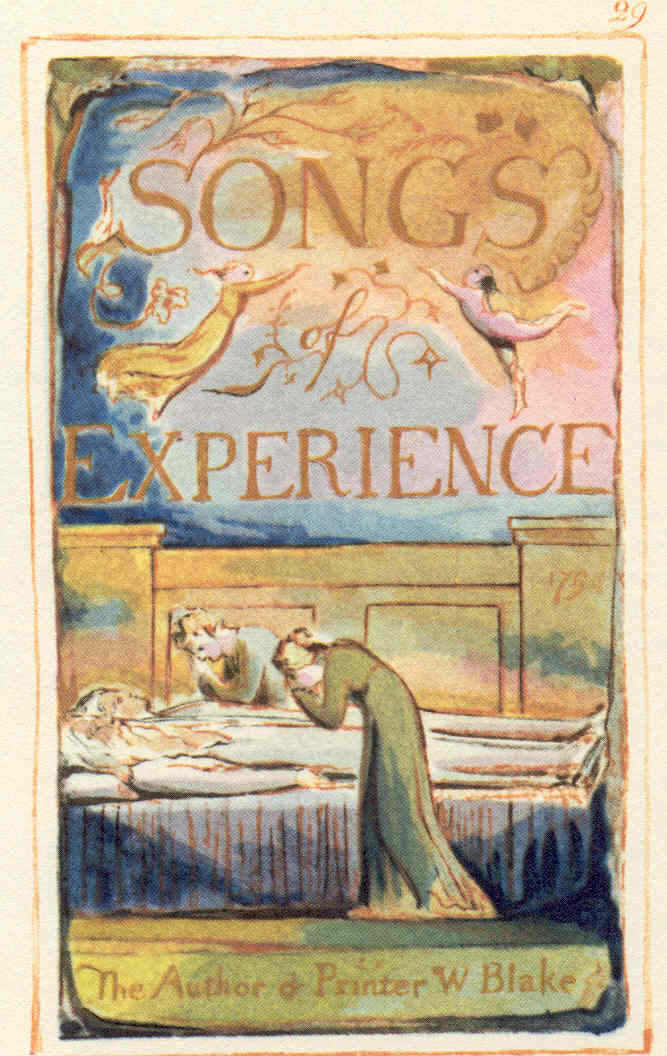OF ALL HIS POEMS I WOULD HAVE TO SAY "A DREAM" WAS MY FAVORITE. IT WAS PRETTY EASY TO UNDERSTAND, BUT THE MAIN
REASON WAS BECAUSE IT KEPT MY INTEREST AND REALLY HAD ME THINKING. WHEN I FIRST READ IT, I THOUGHT THE DREAM WAS ABOUT A BOY,
BUT THAN I CAME TO THINK IT WAS BOUT AN ANT BECAUSE OF THE LINE "OVER A MANY TANGLED SPRAY" MAY BE
REPRESENTING GRASS THAT HE IS TRYING TO SEE THROUGH AND THE GLOW-BUG, WOULD BE HIS GUIDE BACK HOME. OF COURSE THIS IS
ALL OPINION-BASED. READ FOR YOURSELF BELOW AND LEAVE ME A COMMENT IN MY GUESTBOOK, ON WHAT YOU THINK! THANKS.
Once a dream did weave a shade
O'er my angel-guarded bed,
That an emmet lost its way
Where
on grass methought I lay.
Troubled, wildered, and forlorn,
Dark, benighted, travel-worn,
Over many a tangle spray,
All
heart-broke, I heard her say:
'Oh my children! do they cry,
Do they hear their father sigh?
Now they look abroad
to see,
Now return and weep for me.'
Pitying, I dropped a tear:
But I saw a glow-worm near,
Who replied, 'What
wailing wight
Calls the watchman of the night?
'I am set to light the ground,
While the beetle goes his round:
Follow
now the beetle's hum;
Little wanderer, hie thee home!

I NEVER REALLY GOT TO READ ALL OF BLAKE'S POEMS AS I MENTIONED ABOVE, BUT ONE POEM IN PARTICULAR REALLY DIDN'T
SEEM TO INTEREST ME AT ALL. I DIDN'T COMPLETELY UNDERSTAND THE POEM, BUT IT DIDN'T SEEM TO SPARK ANY INTEREST AND WASN'T AS
UNIQUE AS MOST OTHERS HE WROTE. THE POEM IS CALLED "A POISON TREE". I THINK THE POEM WAS NOT AT ALL ABOUT A PHYSICAL
TREE, JUST THE FACT THAT THE TREE WAS A METAPHOR, WHICH I WILL GET TO LATER ON. THE BEGINNING LINE "I was angry with my friend; / I told my wrath, my wrath did end," REALLY SETS UP THE WHOLE POEM. ALSO
THE LINES "AND I WATERED IT WITH MY TEARS" AND "I SUNNED IT WITH MY SMILES." BOTH SHOW METAPHORS
ABOUT WHAT PHYSICALLY A TREE NEEDS TO SURVIVE (HENCE THE TITLE OF THE POEM). MORE IMPORTANTLY I THINK BLAKE SHOWED SIGNS OF
BALANCE; INNOCENCE (WITH THE FRIEND) AND EXPERIENCE (WITH THE FOE). THE SIGNIFICANCE OF THIS, IS INNOCENCE AND EXPERIENCE
HAPPEN TO BE THE TITLE OF TWO OF HIS BOOKS, HIS FIRST (INNOCENCE) AND LAST (EXPERIENCE). CHECK OUT THE POEM BELOW AND LET
ME KNOW IF YOU AGREE WITH WHAT I THOUGHT, OR WOULD JUST LIKE TO ADD SOMETHING OF YOUR OWN! THANKS.
I was angry with my friend:
I told my wrath, my wrath did end.
I was angry with my foe;
I told it not, my wrath
did grow.
And I water'd it in fears,
Night & morning with my tears;
And I sunned it with my smiles
And with soft
deceitful wiles.
And it grew both day and night,
Till it bore an apple bright;
And my foe beheld it shine,
And he knew that
it was mine,
And into my garden stole
When the night had veil'd the pole:
In the morning glad I see
My foe outstretch'd
beneath the tree

A FEW OTHER OF BLAKE'S POEMS OF INTEREST TO ME WERE...
"London"
-London, in my opinion was about everyday life and how it resolves around money and it's necessity
to life. Also about how similar the worklife was from then to now. He switches from chimney sweeper to church. Also the most
important part of the whole poem was the compairison between the soldiers and the blood that runs down the palace walls from
the soldiers. This shows the misery around and that those who are concerned about money, should feel greedy and guilty for
being concerned about that, when soldiers are risking their lives, fighting to protect those who are so lucky to not have
to be part of it.
I wander thro' each charter'd street,
Near where the charter'd Thames does flow.
And mark
in every face I meet
Marks of weakness, marks of woe.
In every cry of every Man,
In every
Infants cry of fear,
In every voice: in every ban,
The mind-forg'd manacles I hear
How
the Chimney-sweepers cry
Every black'ning Church appalls,
And the hapless Soldiers sigh
Runs in blood
down Palace walls
But most thro' midnight streets I hear
How the youthful Harlots curse
Blasts
the new-born Infants tear
And blights with plagues the Marriage hearse
Another one of interest was
"The Divine Image"
-The Divine Image, in my opinion is about basically 4 virtues of life. "Mercy, Pity, Peace and Love."
Blake states that people often pray about these 4 in times of distress, because they represent God. Another thing I noticed
when observing the poem however, is that the 4 virtues are also characteristics of the human. Mercy, which is found in the
heart of course, Pity could be located in the human face, Peace could be the garment that develops humans and Love exists
in the human form or body.
To Mercy Pity Peace and Love,
All pray in their distress:
And to these virtues of delight
Return
their thankfulness.
For Mercy Pity Peace and Love,
Is God our father dear:
And Mercy Pity Peace and
Love,
Is Man his child and care.
For Mercy has a human heart
Pity, a human face:
And Love,
the human form divine,
And Peace, the human dress.
Then every man of every clime,
That prays in his
distress,
Prays to the human form divine
Love Mercy Pity Peace.
And all must love the human form,
In
heathen, turk or jew.
Where Mercy, Love & Pity dwell,
There God is dwelling too.
"The Nurse's Song"
-The Nurse's Song, in my opinion basically is what it says. It's about children playing outside,
while the nurse watches on. As it begins to get dark, she tries to get them to come inside, but the insist to stay out until
the "light falls." The nurse agrees, and the children play shout and laugh with joy while their screams echo through the hills.
When the voices of children are heard on the green
And laughing is heard on the hill,
My
heart is at rest within my breast
And every thing else is still
Then come home my children,
the sun is gone down
And the dews of night arise
Come come leave off play, and let us away
Till
the morning appears in the skies
No no let us play, for it is yet day
And we cannot go to sleep
Besides in the sky, the little birds fly
And the hills are all cover'd with sheep
Well
well go & play till the light fades away
And then go home to bed
The little ones leaped & shouted
& laugh'd
And all the hills ecchoed.
 |
 |
IN HIS SPARE TIME AWAY FROM CREATING POEMS,
HE WAS SAID TO BE GOOD AT DRAWING AND WAS VERY ARTISTIC. HE LIKED TO DRAW PICTURES OF ANYTHING THAT WOULD COME TO MIND AND
WAS SOMETIMES SAID TO BE BETTER AT THAT THAN WRITING POEMS.
|
PATTERNS OF BLAKE'S WORK!
AFTER READING VARIOUS POEMS BY BLAKE, I NOTICED THAT HE USED
METAPHORS IN ALMOST EVERY POEM. ALTHOUGH THAT'S VERY COMMON IN POEMS, HE SEEMED TO DO IT EVERY POEM, LET ALONE EVERY STANZA.
OF ALL THE POETS I'VE LEARNED ABOUT, HE SEEMS TO MIX UP HIS POEMS THE MOST. YOU COULD READ ONE AND IT WOULD BE ABOUT A NICE
BOY THAT GETS SAVED, BUT THAN THE NEXT POEM YOU READ COULD BE ABOUT A BOY LOSING HIS FAMILY AND GETTING BURNED TO DEATH. I
THINK HE'S THE MOST UNIQUE WRITER AND IT REALLY MAKES IT HARD TO SEE ANY OTHER PATTERNS IN HIS WORK.
|
|
 |
 |
|
 |
|

FRIENDS OF BLAKE!
Although Blake wasn't that famous during his life, he still had plenty of friends, despite his crazy family.
Some of them would consist of John Flaxman, who was a famous moulder and sold plaster casts. Another would be James Basire,
whom was an engraver himself and hired William Blake on August 4th, 1772. They became close, until Blake was good enough on
his own and their friendship faded. William and his close brother Robert opened up a print shop in 1784, where they met a
very influential bookseller by the name of Joseph Johnson. Blake was considered popular, but not famous by many people of
his era and I guess that would be pretty accurate.
Blake obviously wasn't around during the musical era of artists we know today, but they did have some music back
than. A famous musician near the end of Blake's life, that he was said to listen to, was Richard Wagner. The most famous and
appreciated by Blake of his time, would have to be Ludwig van Beethoven. His music was loved by all and really defined Western
classical music.
|
 |
|
|
 |
|
|
|

